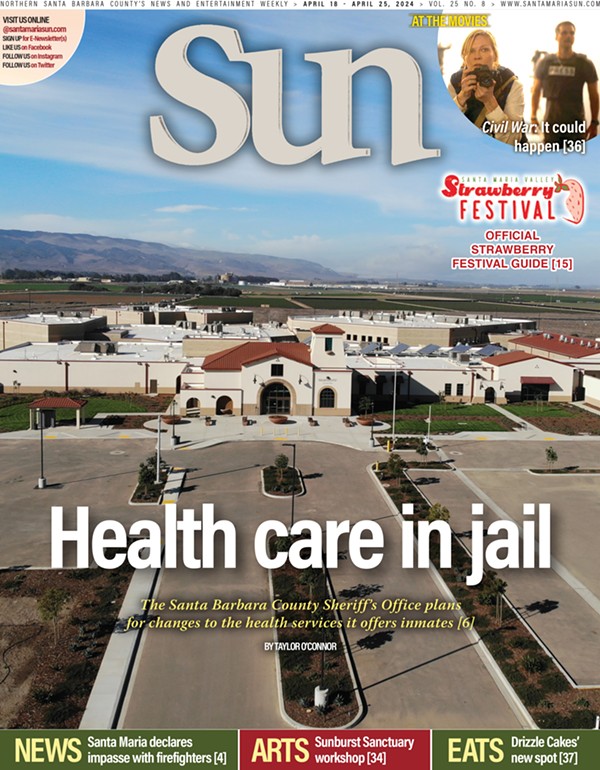Let’s address one thing first before I go on: “The city” doesn’t need more revenue—your city needs more revenue. There is an important distinction here; if we continue to refer to “the city,” it implies that the city is an entity unto itself and not a service provider for the whole community.
Your city is here to serve you, and it costs money to do that. The issue that Measure I2020 is trying to mitigate is that your city doesn’t have enough revenue to provide the services we citizens need and want. In recent commentaries, I have identified the reason for service cuts (“Reality check,” Jan. 16) and tried to highlight those services that might suffer if Measure I2020 doesn’t pass (“Vote yes,” Jan. 30).
Lompoc City Council members are excited about the prospect of more revenue coming in if the proposed 1 percent sales tax (Measure I2020) passes. It’s up to them to determine how any new revenue is spent during budget hearings; it won’t be by a vote of the people.
Over the past several months, the people of the community have clearly identified their priorities, and the council should respect those inputs as “direction” from those who elected them to office.
The city clerk’s webpage gives us two important clues concerning how Measure I2020 could be spent. First they propose to use the money to “maintain and improve public services, including neighborhood police patrols, firefighter staffing, gang enforcement, crime and vandalism prevention, street improvements, community and recreational services, and park upgrades.”
These were the priorities that rang out loud and clear during citizen inputs.
When I read this, my assumption is that services would start improving as soon as the new revenue stream was factored into the next budget. So this is a no-brainer, each of these services needs a major transfusion of revenue in order to provide for our needs and wants. Whether the amount acquired when this tax passes is enough is subject to debate, but we simply can’t continue the current process of endless budget cuts.
The second goal is the “reduction of long-term liabilities (which includes a potential savings of $21 million in interest payments).” This sounds tempting, and some council members have already indicated that this might be the best approach; go all-in to “save” money later.
In order to save the $21 million, our city would have to secure a bond using the new revenue as collateral. The tax measure has a 15-year sunset; this would drive the annual payments for such a bond higher than the anticipated revenues from the measure.
In other words, more money would have to be taken from an already stressed general fund to come up with enough money to secure the bond. This idea deserves considerable thought and discussion before any action is taken. The key issue is “what impacts will this idea have on day-to-day services?”
And, while tempting, it would be in direct conflict with the stated purpose on the ballot measure to use all this revenue for one item on the list since ballot language suggested that all these concerns would benefit.
So far, the arguments against this measure are somewhat simplistic. One citizen told a supporter of Measure I2020 that he “doesn’t want to give police and fire any more funding because then they’ll blare their sirens even more.” How does that sound for a reason to object? This person might not complain if those sirens were on the way to his house when he needed help.
Others suggested more belt tightening to make up the difference, but deep cuts have already been made and there isn’t much left to cut.
I’ll be honest with you: I don’t like to pay taxes, especially state and federal taxes. In this case, Measure I2020 makes sense—the economy isn’t really producing the revenue needed to support essential services, and grants are just short-term infusions of cash for very specific projects.
Whether the tax revenue is used to restore the critical services of police, fire, parks, and library, or whether the tax revenue is used to accelerate unfunded liability payoffs and save millions of dollars of interest on debt, either use is a strong argument for a yes vote on Measure I2020.
It will be critical that City Council carefully evaluate the best uses during each budget cycle evaluation. Securing adequate public safety resources, particularly to restore functions like the Gang Task Unit, is essential to maintaining a safe and healthy future for Lompoc.
A sustained revenue stream is needed to solve our problems, and the proposed tax, used for the stated purposes, seems to be the only way to preserve our city’s services.
Ron Fink writes to the Sun from Lompoc. Send your thoughts, comments, and opinionated letters to [email protected].








